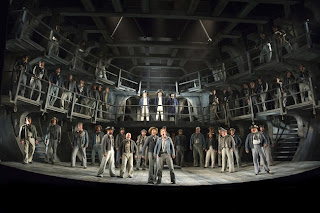 |
| Billy Budd, Glyndebourne 2013, photo credit Richard Hubert Smith |
Whilst Grandage's production is traditional, its concerns were in fact akin to those of David Alden's radically different production for English National Opera. Both deliberately ignored the sense of the sea in Britten's score, and set the opera in an enclosed world in the middle of the ship. There, of course, they part company with Grandage and Oran offering us a very detailed reconstruction of life on a Napoleonic ship. Oran's accurate costumes combined with Grandage's detailed action for the sailors, into apparently presenting a realistic view of life on a Napoleonic era man of war. This was deceptive, of course, the set was in fact the hollowed out centre of the ship, stylised rather than realistic, and the action though detailed, would never have passed muster on a real man'o war; there was often the sense of action for the sake of it. But the top level of Oran's set lowered impressively so that for some of the scenes below decks, we got a real feeling of the pressure-cooker nature of life on board.
And Grandage's action, if you did not look in too much detail, had an important effect, it provided the backdrop to everyday life on the ship, the fabric of the lives of the individuals. Grandage's handling of the big moments was very confident, with the whole set articulated by the cast (nearly 80 people on stage). The muster at the opening of Act 2, when the French ship is sighted, was really thrilling with the visual action matching Britten's music, giving a real sense of excitement and tension. The impressive thing about the production was that, whatever people were doing on stage, they gave the impression that they were doing it because they had to, it was part of their daily life. All this formed a backdrop for a very clear telling of the story. Billy Budd has a large cast, and its important that we know who everyone is quickly. Grandage, helped by Oram's costumes, ensured that we did.
I have to say that one day I hope to see a production which gives full reign to the homo-erotic charge between Claggart and Billy. Here Brindley Sherratt was a brilliantly severe, repressed Claggart. This was a thrilling account of the role and one which Sherratt's intelligence mitigated the sheer darkness of his voice and prevented the character from descending into caricature.
 |
| Mark Padmore and Jacques Imbrailo, Billy Budd, Glyndebourne 2013, Photo credit Richard Hubert Smith |
In the opening and closing scenes Mark Padmore's Vere was a remarkably distant, haunted figure, the voice on a thread of sound. This was the magical Padmore that we are familiar with from the recital hall. In many ways this was a daring performance, because Padmore's Vere was rather inward and conflicted, there was little that was open and direct. In the action scenes, Padmore was in brilliant voice, at times reminding me of Philip Langridge, who was a very fine Vere. There was a severity of Padmore, a sign that like Claggart, he too was repressed. The scenes in which Vere testifies to the drumhead court were shocking in the severity of the way Padmore denied any ability to help Billy. Directors like to suggest Vere and Claggart as opposite sides of the same coin, but here it was done with subtlety and suggestion of character.
The rest of the cast were finely balanced with each man having his moment. Stephen Gadd was almost unrecognisable under a forest of red hair and beard (there was a sense that the production had gone a bit mad in the wig shop), but he gave his usually fully rounded performance, giving us the sense of a good, sensible man caught up in things. Gadd was ably abetted by Darren Jeffery as Lieutenant Ratcliffe and David Soar as Mr Flint.
Below decks, Peter Gijsbertsen made a very touching and trusting novice, easily manipulated by Claggart. Colin Judson was an aptly slimy squeak, and Duncan Rock was in strong form as the Novice's friend. Jeremy White gave a finely crafted and fully rounded performance as Dansker, one of those role which benefits from a fine singing actor.
In the pit, the London Philharmonic Orchestra were on strong form, giving us some thrilling playing and some fine subtle moments. Britten uses a big orchestra, and the big moments are loud but here were never less than expressive. Confidently in charge was Andrew Davis, giving a fine and thoughtful account of the score.
This was powerful revival with a strong emotional pull. The opera is in repertory at Glyndebourne until 25 August and the 2010 production will be broadcast in Cinemas this month. See the Glyndebourne website for further details.
Elsewhere on this blog:
- Win tickets to Live by the Lake, Kenwood
- Tete a Tete: the Opera Festival
- Viktor Bijelovic - Empassioned - CD review
- Grimeborn - Magic Flute
- The Bear goes Walkabout
- Stile Antico - Phoenix Rising - CD review
- Dinner opera at the diner - Roma and La Plus Forte
- Dai Fujikura - Flare - CD review
- Edward Cowie - Gesangbuch - CD review
- Svein Helbig - Pocket Symphonies - CD review
- Home











No comments:
Post a Comment